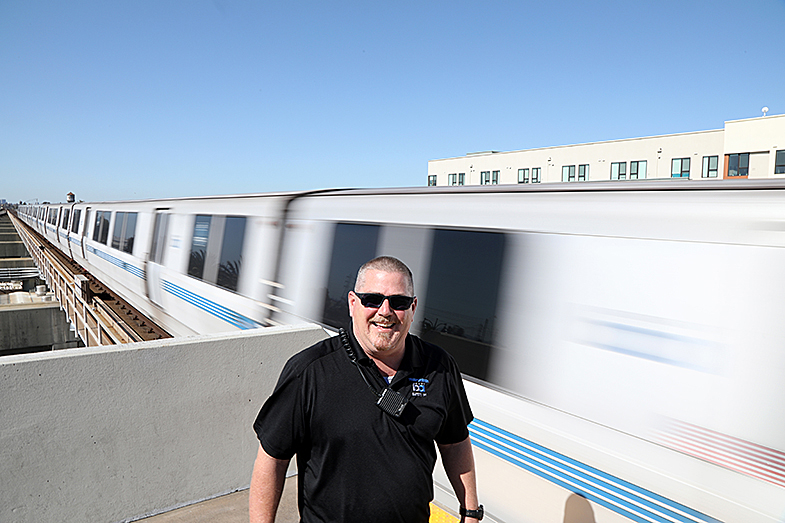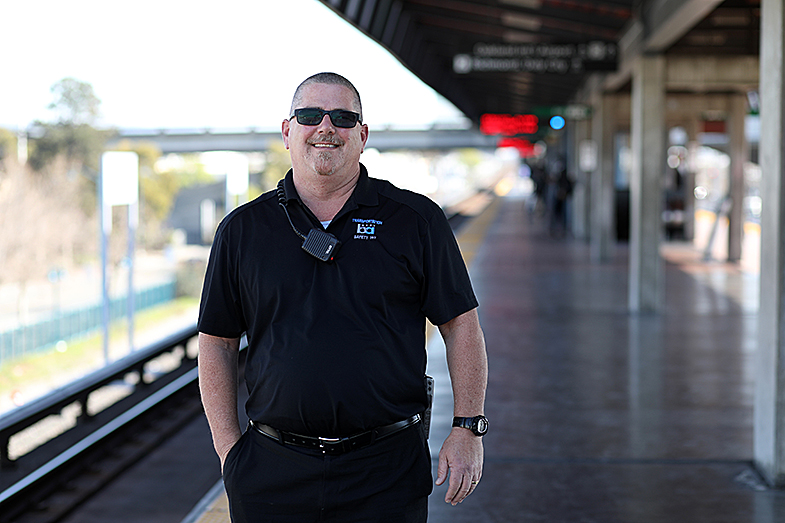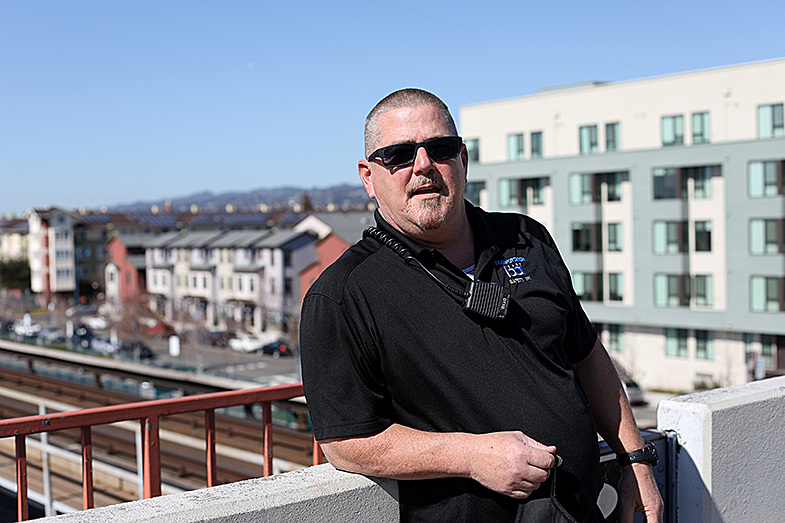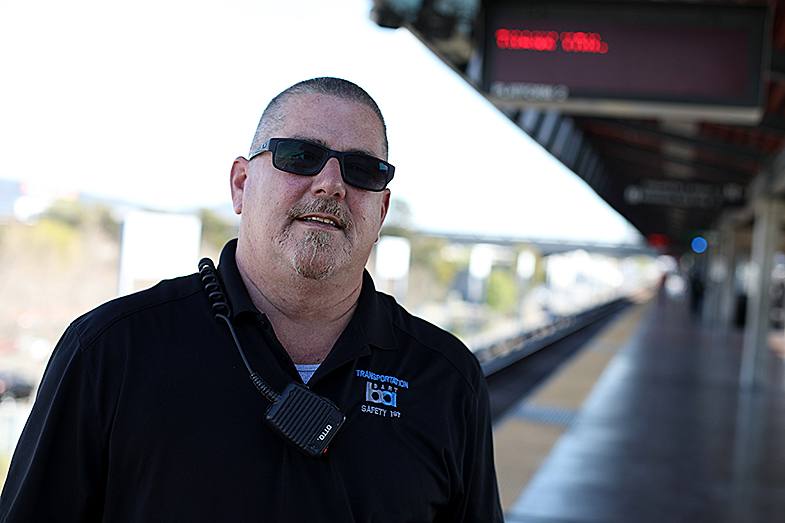Podcast: Transit Worker Appreciation Day marks a time of transition at BART
Podcast transcript:
HOST: BART’s podcast series “Hidden Tracks: Stories from BART” is back just in time for national Transit Worker Appreciation Day. In our latest episode we’ll hear from John O’Connor who is one of the 287 employees participating in BART’s District Retirement Incentive Program as the agency cuts costs amid financial challenges brought on by the COVID-19 pandemic. O’Connor is a Transportation Supervisor who has spent a quarter century at BART and is probably best known for saving the life of a man who fell into the tracks at the Coliseum Station after a Raiders game by pulling him back to the platform just as an oncoming train was arriving. O’Connor talks about his difficult decision to retire, his fond memories at BART, and the future of the agency as some of its most experienced employees depart.
I’m speaking with John O'Connor, a longtime employee of BART, a Transportation Supervisor now and John, you've been here for 25, more than 25 years, but you're one of the employees who took the retirement incentive so you're going to be stepping away. You've really had an amazing career here at BART. What has it meant to you to be part of this agency for so long?
O’CONNOR: It's meant a lot. I mean, first and foremost, it was a blessing to get here. I was driving a truck for $12:50 an hour until I got here. So, it's allowed me to raise three kids, and then when you say longevity, there's nothing better than having a secure job, and the ability to raise your family. Like I say 25 years, when you say it I think of the people that have been here almost 50 years Linda Vasquez, Andy Williams, Steve Williams, and Don Orth, I mean those people who've been fixtures here so I feel dwarfed with my 25 compared to their almost 50.
HOST: John, tell me a little bit about your journey and getting to BART. How did you first arrive here and what was your first job?
O’CONNOR: I started off as a Train Operator, my sister, my older sister had gotten a job here, and her and my wife actually turned in my application for me. The day I was supposed to go test at Bicentennial Hall in Hayward was the day to have the asbestos spill on the Bay Bridge so all the roads were jacked up, and I'm over at See's Candy delivering 50,000 pounds of sugar, and I ended up driving that tanker truck up to Bicentennial Hall, and parking it in the red zone and run it down and barely getting in to be able to test. So, after that, they were taking certain groups, they sent me a letter that said, you weren't in first group, have a good life. A few months later I got another letter said we've decided to take the next group down. Congratulations, you're in. Worked out super well because at that time C&H Sugar was going on strike, and I told my boss to lay me off because I didn't want to deliver sugar while these guys are trying to stand for something and lo and behold, here I am. I started training operator class, I had orientation on October 16, 1995, which Linda Vasquez actually did. And I was a Train Operator for 20 years. ATU steward. You know, I speak kind of freely but it's because I care. Some people might have thought I was a troublemaker but in the name of safety, I've been in transportation for 32, 33 years. All inclusive of the truck driving and this. So, I mean I just can't say what a blessing BART has been to me. And the fact that I'm leaving a little early. Leaving some money on the table just for quality of life, I'm 57. I got three grandsons now and just want to kind of try to enjoy the rest of life.
HOST: We'll talk about the District's Retirement Incentive Program, but you mentioned transporting 50,000 pounds of sugar you went from that to transporting what pre-pandemic was more than 400,000 people a day. Talk about the differences between those two jobs.
O’CONNOR: They're all safety oriented because you don't have rails in a big rig. But when you have, you know, 1,500 people riding with 10-car train going through the Transbay Tube and knowing that you're the only guy that's going to get them out of there, obviously with the help of the Operations Control Center and other people that we have plans that we use in those situations, but that's a lot of people to try to control and get out of there safely so you know it's a big charge. And then I guess with truck driving you have people that pull out in front of you in trucks but here with trains we get people to jump in front of us. And you know, my son had somebody jumped in front of him so that that's a, it's a heavy weight to carry. You know, you're responsible for life and property in both situations, they're different but they're parallel.
HOST: I can only imagine. I'm speaking with John O'Connor Transportation Supervisor at BART and it is all about those relationships, working together we were talking about teamwork. Do you think the Bay Area is aware of all the moving parts, and all the people that go into helping this transit agency to operate on a daily basis?
O’CONNOR: No, I don't think they have a real idea that, you know, we do the best we can to keep it clean and safe, and we're only a bigger picture of the communities we serve. When we have everybody that has all the rights that they have in the world today, you know we have to work within that structure to try to keep everybody happy not offend anybody, or, treat anyone wrongly. So, it's difficult, you have the people in payroll, you have the BART Police, you have the supervisors the Train Operators and Station Agents, their daily needs, the foreworkers. Everybody comes together and does the best they can here with what we have. There's just, it's such a deep, deep, deep company and the young, relatively when you think about it what they started in 1973, you know, so BART's still evolving, and still trying to do the best they can with what they have.
HOST: Talk about that. What kind of changes have you seen in your 25 years?
O’CONNOR: Oh man. Well we've definitely become far more stringent on a lot of the safety rules. You know, just different rules and regulations, just because, as you develop as a company, things don't happen you can't foresee everything so, something happens and creates a rule for the situation. The heck, all the extensions. Wow, Pittsburg, they were building Colma Station when I started. And it was always my goal to get out towards Concord because I live in Antioch and now to see where it is everywhere. We're going to, here's a Berryessa train here, you know you got Pittsburg-Bay Point. You got the airport in Millbrae so to see it expanding is certainly different. It makes it a lot harder to manage because there's more trackway, more people, more everything. Obviously, COVID kind of put an abrupt stop to a lot of stuff here.
HOST: We're talking about all the experiences you've had you've kind of seen it all, but I cannot imagine any year has been like what you've experienced in the last 12 months. Talk about what your job has been like, as a Transportation Supervisor during this pandemic.
O’CONNOR: Wow, it's been a, it added a whole different level of responsibilities. Getting cleaning supplies out, sterilize wipes that we started off with Lysol, Lysol ran out, getting masks, getting people to wear masks. There's a whole political issue on that but you know I agree with the statement that if you ain't wearing it for yourself at least wear it for the other people. Taking inventory, different responsibilities because of the drop in it, in ridership. It's a lot, there's just a lot different than before that we were dealing with a lot more passenger complaints, a lot of other different issues staffing issues, attendance during things. But then all of a sudden nobody was riding and so it's a challenge.
HOST: It's interesting because the ridership remains low compared to where it was pre-pandemic and yet the folks that are riding BART now, you have a mix of essential workers, and a mix of folks who in many cases are riding BART because that's their only option. They rely on us, we're a lifeline for them. Does that remind you, when you think about that sort of thing, does it really kind of remind you of the importance of this job and what it really does mean to people in the Bay Area?
O’CONNOR: It makes it very important, especially when you talk about people that can't afford to get where they're getting, trying to get to, you know, try to provide an affordable, safe, timely, transportation agency. Without that, where are those people going to be? I think that's very important. I think regardless of who it is we all have an obligation to give people what they're paying for, you know, we're publicly funded to a degree, but we do count on those faregates as well. So, you know it's a hard mix. We're the ones that get the teachers, the nurses, even the students when school is in session to school. So, it's really important that we make it as safe as we possibly can.
HOST: Speaking with John O'Connor Transportation Supervisor at BART we're at the Oakland Coliseum platform right now at the BART station, and, you know, it must have been, I can only imagine the decision that had to go in to agreeing to retirement. Transit agencies across the country, across the world are facing similar challenges, and that certainly gets to the bottom line for these agencies the finances. They're looking to cut costs so for BART there's the District Retirement Incentive Program, and it has, I mean you just consider how many longtime employees there are here at BART, how difficult of a decision was that for you to decide to participate in this program?
O’CONNOR: It is very difficult. I mean, reality for me, we say how long 25 years is when you calculate that in PERS, I'm leaving money on the table. More for quality of life but also with the idea of making room for others. It was a hard decision, because now you're on a limited income and that part was scary. Not coming to work has always been a great idea. Wanted to be here but, yeah, I mean I grew up poor, so I looked at the money that I'm getting there and looked at and figured out that I could probably just, I can survive because I'm easy. Give me a set of dominoes and a beer or something and some good company with small music, and I'm fine. My wife said, you know, she looked at it, she says if we can get that number, we can make it work. So, I was hoping it was gonna, they would have given us like two years of service at my shift differential but, you know, that money there that they're giving us, it helps. It goes into the MPP, it's money I'll tap into to survive on moving forward, eventually, but I won't be, I won't be destitute I don't think. Like I said, pretty easily entertained.
HOST: That's a good thing in life, but for BART, I mean the job moves forward, and that's a lot of experience walking out the door in all departments across the agency, how big of a challenge do you think that's going to be for BART?
O’CONNOR: I think that's going to be a big challenge because BART, and I'm not saying it to be derogatory, but they typically don't have people shadow each other. I remember being on the train one morning we had a Train Control Engineer working on a track circuit board, and working with the Operations Control Center, and he was actually rebuilding that board out there on the mainline, so that we can get service into the airport. And I talked to the guy because I had met him a long time ago back in '97 and he said yeah, no they're not having nobody work with me so when I referenced like the as-builts and the things you have people that were here and have an idea of how to get things working and in a pinch. They're all going to be going and hopefully not all of them will be taking that information with them, Hopefully, some people are getting shout out and getting some of the history and tradition passed down to them. It's gonna be a challenge. It's gonna be a challenge.
HOST: The knowledge that you have isn't just even, I mean obviously it's job experience but you kind of know the ins and outs beyond just the ordinary rules. Like you know with our older trains, you guys know all the tricks. You have all the ins and outs you know every corner of these stations. That's really hard to pass down in a manual or anything like that.
O’CONNOR: When I got hired you were a rookie for five years. We got a lot of people that come in that act like they know everything and then they get a few bumps along the way and find out all of a sudden maybe they don't. Some people are more resilient, just keep that attitude but at the end of the day, I think like we said before, communication amongst each other, your peers, your subordinates, your unions. When you communicate and have a clear vision of where you're going, what you should be doing I think it helps. I always reference when I was steward if I saw somebody doing something wrong I let him know hey man, I'm not your boss but you know what you represent us all, and that's gonna be hard to defend. One thing I certainly advocated for was be a union professional and so hopefully they can maintain that level of self-policing without incident. Right, you don't need people fighting and arguing about it but take some pride in the fact that you serve the greater good for the public for BART that's your job, make yourself necessary.
HOST: Speaking with John O'Connor Transportation Supervisor for BART we are at the Coliseum Station on the platform at the station. John, this has got to bring back, certainly memories for you. The work that BART frontline workers do literally saves lives, and that was the case for you, after a Raiders game here at the Coliseum Station tell us, remind us what happened.
O’CONNOR: Oh, that was down the way a little they're just doing crowd control as we always do for the events that hopefully come back, least we know the A's will be back. Just doing crowd control. Keeping the people back they tend to bunch up. Young man, RayShawn Jackson and I'm friends with him on Facebook, these days, stepping around me and misstep into the trackway and the video speaks for itself, I suppose. Then there was the gentleman that tweeted it made it all and that's what started the whole ride, which I gotta say was a great ride. The Warriors, 49ers, Raiders, Cal. They honored me at all the games, and I couldn't have been thankful enough. I think I did the thing on ABC 7 and got to meet Jerry Rice, and then he remembered me at one of the games so that was something. Yeah. If it hadn't been caught on camera it just would have been a good drink and story.
HOST: Yeah, but let's be clear, I mean, that poor gentlemen ended up in the trackway and you got him out of there right before the train came.
O’CONNOR: Yeah, I did I'm not really prone to panic. It was like, hey, just look down and said, hey I can get him. So, I did. But you talk about everybody saving lives here at BART, and it reminds me because of that, I was given the Good Samaritan award by BART Police. At that award ceremony we had a Station Agent who gave mouth-to-mouth resuscitation to a passenger that needed it. We had three civilians who witnessed people trying to steal cellphones from people and they jumped on those guys and held them until BART police could get there. So, I said it during all the interviews. We do this on a daily basis, whether it's nowadays we're doing more masks stops but whether it's somebody ODing. I mean, I have heard a manager, tell me about a story he had where, you know, they broke out Narcan and saved the guy. There's the old people that, you know, need assistance, I see Train Operators and Station Agents, assist with that via the radio, there's the communication aspect.
HOST: I mean it really is a position where you can impact people's lives, and there's nothing more basic than transportation, and in fact it's Transit Worker Appreciation Day. Is it nice to see that sort of recognition where there's an actual day where people will take timeout and recognize the work that transit employees do?
O’CONNOR: Yeah, without a doubt because having been the Train Operator and then the victim of the person who was mad because the train was late, or without regards to the reason why, the Station Agent having witnessed Station Agents and then a victim of people yelling at you for no reason or because they don't have problems with it, they have problems with a ticket, but don't want to listen to let to get it fixed. There's a lot of abuse that goes on. Proud society, but particularly to the Station Agents and Train Operators, and some of our System Service Workers. Yeah, the public can be brutal, so they definitely need to get a little recognition I think a little recognition helps everybody everywhere.
HOST: What's your favorite part of your job?
O’CONNOR: The people. The people I work with, 25 years is a long time. Not as long as 50. But you know what, regardless of classification or job title we got a lot of smart, great people that work here. I think I've only had bad experiences with maybe two people that I've worked with over the 25 years because when it all hits the fan, we jumped in, we jump in together, and we get it done. So, you know I've got friends that I'll have for life here. A lot of people that maybe we won't interact so much but when we see each other we, you know, BART's a big family. I don't care where you go, you may see, you're gonna see somebody that worked for BART. You may not even know it but once you find out there's that instant bond, you know, so, yeah, working with the people. Making sure I think one of the most satisfying things is getting people what they need when they need it, you know, because it didn't always work that way. That was one of the main goals when I got promoted was, my radio's broken. Boom I got it for you the next day. I can't do that without the people in scheduling that you know so it's a team effort. But it's just nice to be able to fix what I can within my limitations and make sure that I give everybody the equipment and attitude they need to succeed.
HOST: You must take a lot of pride in doing that work and knowing how many people in impact.
O’CONNOR: Yeah, I care. I had a conversation with somebody. I said look man, you can say that you don't care what people think about you, but to me it's important because when the chips are down, you need somebody if they care about you, they're gonna do something for you if they don't, then they won't. So, putting effort into that kind of maintaining relationships. I told you earlier, I grew up with a lot of self-conscious issues. There are just certain things, I'm always trying to be as good as I can because I wasn't always so I'm always just going to give it my best effort, best care I'm going to try to care. And so yeah, maybe I've strayed too far.
HOST: You got emotional when I asked you about your experiences here and just how special it is working with the team that you've been a part of. When you look back now that you're just days away from the end of your tenure at BART what do you think you're going to remember?
O’CONNOR: What am I going to forget? I'm going to remember all the old, old, OG guys like Tony Hernandez, Big Rook Larry Williams. There's just a lot of people that I've worked with over the years, Charlie Walker, just a lot of great relationships. Willie Kriner the guy that taught me how to play golf. I still play horribly. But I guess it's gonna be the people. Just people man in stories, you know, because I mean, some stories get told. The Coliseum incident got captured on film and went viral, didn't tell you about the story a week later where the, the man after him with a schizophrenic, getting off the train. She had no hands so I helped her carry her bags down and then she told me she wanted help so I took her downstairs, called BART Police they came and got her and got her the help she needed. Those are the things that we do all the time those stories we don't always tell I mean we tell them amongst each other. But there's a lot of people have gone through a lot.
HOST: John O’Connor thank you so much for telling us your story, and even more importantly than that, thank you for your service 25 years at BART, that's an incredible legacy.
O’CONNOR: Thank you very much. My pleasure and BART was good to me.
HOST: “And thank you for listening to ‘Hidden Tracks: Stories from BART.’ You can listen to our podcasts on SoundCloud, iTunes, Google Play, Stitcher, and of course at our website BART.gov/podcasts.”



